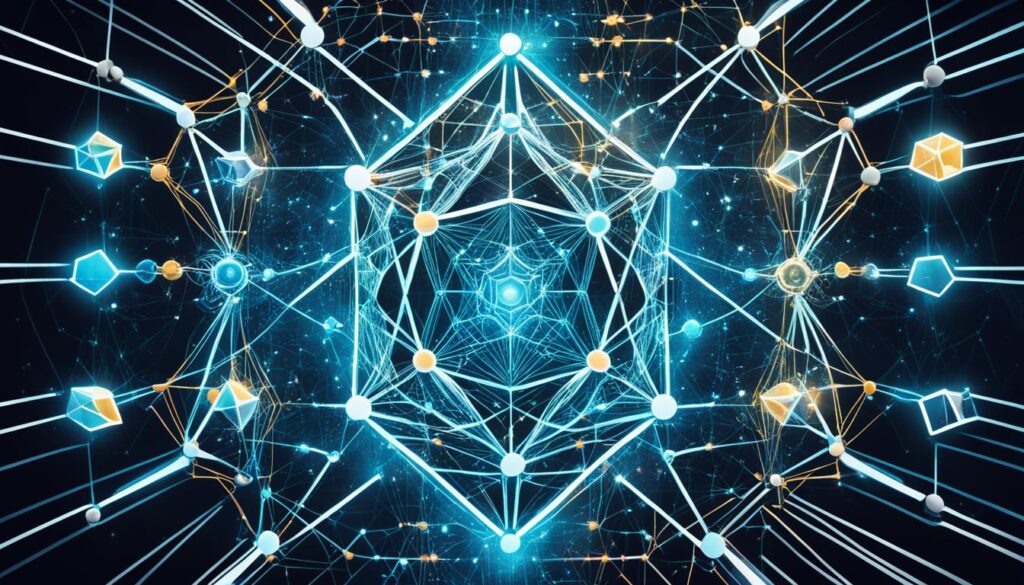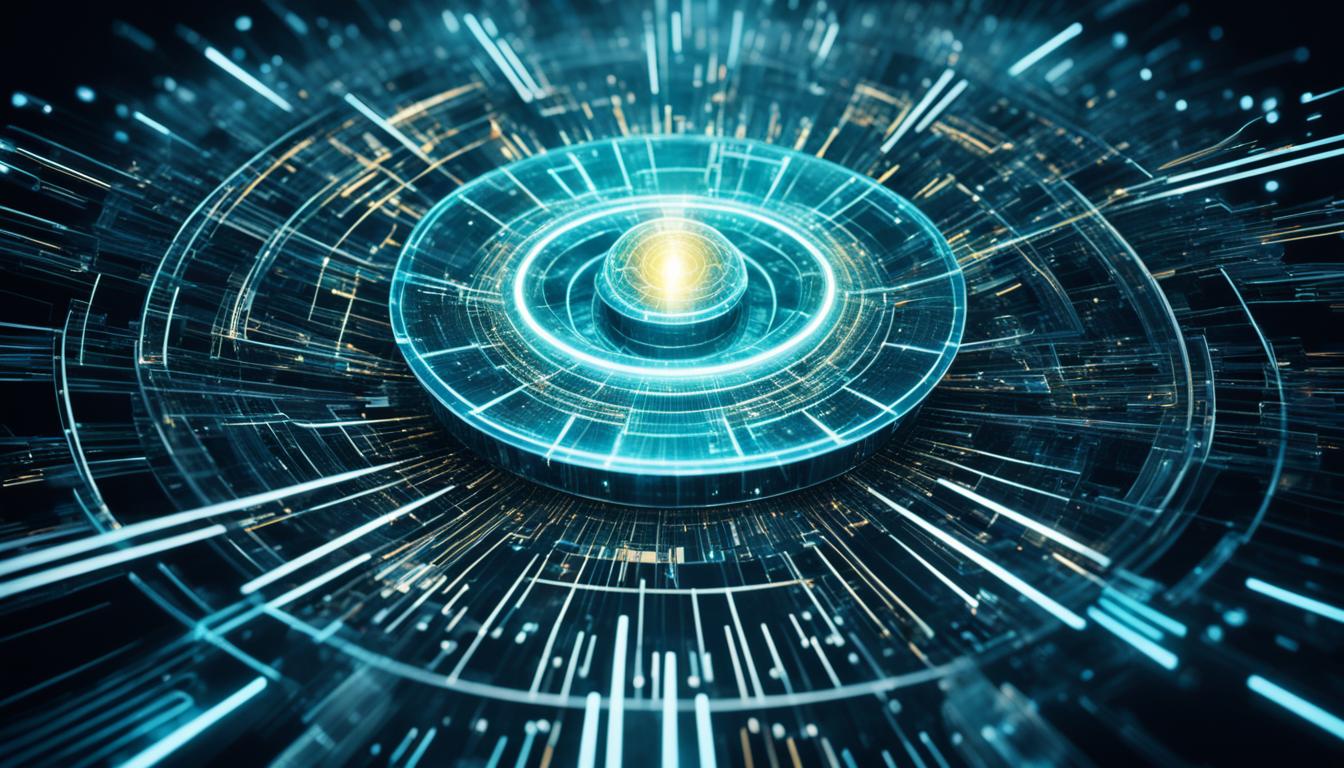Did you know that quantum computing could potentially render the security measures of decentralized autonomous organizations (DAOs) obsolete? As blockchain technology and smart contracts continue to gain momentum, the emergence of quantum computing poses new security vulnerabilities that need to be addressed. However, there is a solution on the horizon – Quantum AI. This powerful fusion of quantum computing and artificial intelligence has the potential to enhance decision-making and efficiency in DAOs while mitigating the risks posed by quantum computing.
Key Takeaways:
- Decentralized Autonomous Organizations (DAOs) operate on blockchain technology and smart contracts.
- Quantum computing poses security vulnerabilities to DAOs.
- Quantum AI has the potential to enhance decision-making and efficiency in DAOs.
- Quantum-Safe DAOs (QSDAOs) are being developed to address security risks.
- The integration of Quantum AI in DAOs offers decentralized decision-making, predictive insights, and automation.
Enhancing Security in Quantum-Safe DAOs
As quantum computing continues to advance, the security vulnerabilities in traditional decentralized autonomous organizations (DAOs) become a growing concern. To safeguard against these risks, the development of Quantum-Safe DAOs (QSDAOs) is underway. Enhanced security measures are crucial in ensuring the resilience of QSDAOs, protecting sensitive data, and maintaining trust among stakeholders.
Implementing Quantum-Resistant Cryptography
One of the key considerations in securing QSDAOs is the implementation of quantum-resistant cryptography algorithms. Traditional cryptographic algorithms, such as RSA and ECC, are vulnerable to attacks from quantum computers. Quantum-resistant cryptography, also known as post-quantum cryptography, offers algorithms that can withstand the computational power of quantum machines.
Developing Quantum-Resistant Smart Contracts
In addition to cryptography, the development of quantum-resistant smart contracts is essential for maintaining the security and integrity of QSDAOs. By utilizing advanced cryptographic techniques, quantum-resistant smart contracts ensure that transactions and agreements within the DAO are secure against quantum attacks.
Devising Quantum-Safe Consensus Mechanisms
Consensus mechanisms play a crucial role in maintaining the decentralized nature of DAOs. In the context of QSDAOs, it is vital to devise quantum-safe consensus mechanisms that are resilient against quantum threats. These mechanisms ensure that the decision-making processes within the DAO remain secure even in the presence of quantum adversaries.
Conducting Regular Security Audits
To identify and address potential security vulnerabilities, regular security audits are paramount for QSDAOs. These audits involve comprehensive reviews of the DAO’s protocols, smart contracts, and systems to detect any weaknesses or potential exploits. By proactively uncovering vulnerabilities, QSDAOs can take appropriate measures to strengthen their security defenses.
Education and Awareness
Education and awareness regarding quantum threats are crucial for the successful implementation of Quantum-Safe DAOs. Stakeholders, including developers, users, and investors, need to understand the potential risks associated with quantum computing and the importance of adopting quantum-resistant security measures. Promoting education and awareness programs helps foster a security-conscious environment within the QSDAO ecosystem.
Interoperability and Standards
Interoperability and the establishment of standards are paramount for the widespread adoption of Quantum-Safe DAOs. By defining interoperability protocols and industry standards, QSDAOs can ensure compatibility and smooth integration with existing blockchain networks. This facilitates the seamless exchange of assets, data, and transactions while maintaining the required quantum-resistant security measures.
“The security of Quantum-Safe DAOs relies on a multi-faceted approach involving advanced cryptographic algorithms, secure smart contracts, robust consensus mechanisms, regular security audits, education, and interoperability standards.”
To illustrate the importance of these security considerations in QSDAOs, let’s take a look at a comparative table showcasing the vulnerabilities of traditional DAOs versus the enhanced security measures in Quantum-Safe DAOs:
| Traditional DAOs | Quantum-Safe DAOs | |
|---|---|---|
| Security Vulnerabilities | Prone to attacks from quantum computers due to weak cryptographic algorithms. | Utilize quantum-resistant cryptography to withstand quantum attacks. |
| Smart Contract Security | Vulnerable to quantum attacks on cryptographic operations within smart contracts. | Develop quantum-resistant smart contracts to ensure transactional security. |
| Consensus Mechanisms | Susceptible to quantum attacks compromising the integrity of decision-making processes. | Devised quantum-safe consensus mechanisms for secure decision-making. |
| Security Audits | Security vulnerabilities may go undetected, leading to potential exploits. | Conduct regular security audits to proactively identify and address vulnerabilities. |
| Education and Awareness | Limited understanding of quantum threats and the need for enhanced security measures. | Emphasize education and awareness programs to foster a security-conscious environment. |
| Interoperability | No standardized protocols for seamless integration and exchange of assets. | Establish interoperability standards for compatibility with existing blockchain networks. |
By implementing these enhanced security measures, Quantum-Safe DAOs can mitigate the risks posed by quantum computing, ensuring the long-term security and resilience of decentralized autonomous organizations.
The Integration of Quantum AI in DAOs
The integration of Quantum AI in Decentralized Autonomous Organizations (DAOs) brings about a multitude of advantages. By leveraging the power of Quantum AI, DAOs can enhance decision-making processes, provide predictive insights, deliver personalized member experiences, streamline automation, and improve overall efficiency.
Decentralized Decision-Making
One key benefit of integrating Quantum AI in DAOs is the facilitation of decentralized decision-making. Quantum AI algorithms can analyze vast amounts of data and deliver intelligent recommendations to DAO members. This enables a more democratic and inclusive decision-making process, where decisions are made based on objective insights rather than centralized authority.
Predictive Insights
Quantum AI’s advanced analytics capabilities enable the generation of predictive insights within DAOs. By analyzing historical data and patterns, Quantum AI algorithms can offer valuable foresight into future trends and outcomes. This empowers DAOs to make informed decisions and take proactive actions to stay ahead of the curve.
Personalized Member Experience
With the integration of Quantum AI, DAOs can offer personalized member experiences through AI-driven chatbots. These chatbots use Natural Language Processing (NLP) algorithms to understand and respond to member queries, provide relevant information, and offer tailored recommendations. This creates a more engaging and user-friendly experience for DAO members.
Automation and Efficiency
Another benefit of Quantum AI integration in DAOs is the automation of routine decisions. Quantum AI algorithms can learn from past decisions and automate repetitive tasks, freeing up human resources for more strategic and creative endeavors. This streamlines processes, reduces costs, and improves overall efficiency within DAOs.
The table below demonstrates the potential impact of Quantum AI integration on the efficiency of DAOs:
| Without Quantum AI Integration | With Quantum AI Integration |
|---|---|
| Manual decision-making processes | Automated and AI-assisted decision-making |
| Limited insights from data | Predictive insights based on extensive data analysis |
| Generic member support | Personalized member experiences through AI-driven chatbots |
| Inefficient use of resources | Automation leading to improved resource utilization |
By embracing Quantum AI integration, DAOs can unlock their full potential and achieve greater efficiency and effectiveness in their operations.

Overall, the integration of Quantum AI in DAOs revolutionizes decision-making processes, enhances member experiences, and drives automation and efficiency. As DAOs continue to evolve, harnessing the power of Quantum AI will be essential for organizations to stay competitive and thrive in the decentralized landscape.
Conclusion
The fusion of Quantum AI in Decentralized Autonomous Organizations (DAOs) holds immense potential for reshaping the future of organizational design and decision-making. While there are security challenges that need to be addressed, implementing quantum-safe measures can effectively mitigate these risks and ensure the integrity of DAO operations.
As we look ahead, the future of Quantum AI in DAOs relies heavily on user adoption. Encouraging and facilitating the widespread acceptance of Quantum AI technologies within the DAO community will be crucial for unlocking its full potential. This includes investing in education and awareness initiatives to familiarize stakeholders with the benefits and implications of Quantum AI, as well as providing resources and support for their integration into existing DAO frameworks.
Continued research and development efforts are also fundamental for advancing the realm of Quantum AI in DAOs. By driving innovation and refining existing technologies, we can further enhance the capabilities of Quantum AI, making it more accessible, efficient, and scalable for DAO applications. Additionally, collaboration among researchers, developers, and industry experts will play a pivotal role in collectively shaping the future trajectory of this exciting field.
To ensure the widespread adoption and implementation of Quantum AI in DAOs, the establishment of regulatory frameworks and security measures is essential. The regulatory landscape surrounding DAO operations must adapt to accommodate the unique challenges and opportunities presented by Quantum AI, safeguarding the integrity and confidentiality of data, while promoting transparency and accountability within the decentralized ecosystem.
In conclusion, the integration of Quantum AI in DAOs signifies a paradigm shift in organizational design and decision-making. With its potential to enhance efficiency, enable decentralized decision-making, and provide predictive insights, Quantum AI empowers DAOs to operate in a more agile and intelligent manner. As we navigate the future, it is essential that we embrace these transformative technologies while upholding stringent security measures, fostering user adoption, and staying attuned to the evolving regulatory landscape.
FAQ
What are Decentralized Autonomous Organizations (DAOs)?
What are the security concerns for DAOs with the emergence of quantum computing?
What are Quantum-Safe DAOs (QSDAOs)?
What are the key considerations for enhancing security in QSDAOs?
What are the benefits of integrating Quantum AI in DAOs?
How can Quantum AI reshape the future of organizational design and decision-making?
How can security risks be mitigated in Quantum AI in DAOs?
What factors will determine the future of Quantum AI in DAOs?
Source Links
- https://medium.com/@syedhasnaatabbas/daos-and-quantum-safe-decentralized-autonomous-organizations-a-new-security-frontier-bf0bff9d4304
- https://www.linkedin.com/pulse/evolution-future-daos-embracing-ai-new-technologies-dr-willie-shi
- https://medium.com/@syedhasnaatabbas/daos-and-quantum-safe-decentralized-autonomous-organizations-a-security-paradigm-3d329f091c1b

Leave a Reply